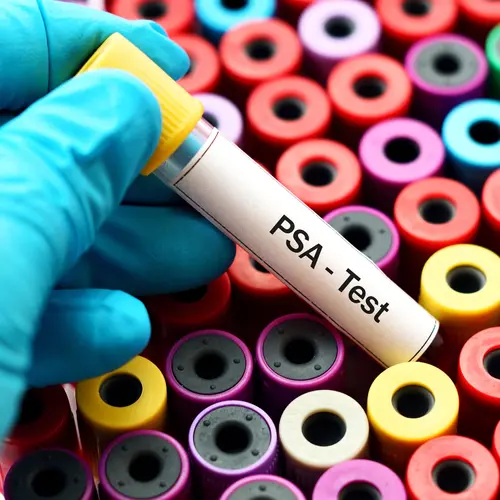Faced with choices to treat his prostate cancer, Tim Henson chose radiation and injecting a drug that lowers his testosterone, the hormone that feeds his tumor, to almost zero.
Three months into his treatment, “I’m thinking dealing with hormone therapy is going to be the worst part of it,” says Henson, a 57-year-old dentist in San Antonio, TX. He has hot flashes, night sweats, sudden crying jags, “brain fog,” and a total lack of sexual desire.
“I mean, I was very sexually active for a guy my age, and the loss of that was hard,” he says. “Any guy can say that since the age of 12, he’s had sexual thoughts at least 20 times a day. Now my screen is totally blank.”
Luckily, Henson’s supportive, long-term girlfriend, Julie, helps him find ways to deal with some of these side effects.
“She went through menopause five years ago, so she told me some ways to deal with hot flashes, like putting my hands on a cold surface or even a cold glass of water for a fast cool-down,” he says.
Mostly, he worries about the effect his lost interest in sex will have on their relationship. “We just try to maintain intimacy as much as you can up to intercourse.”
What Side Effects Can I Expect?
All prostate cancer treatments have possible side effects, says Sean Cavanaugh, MD, chief of radiation oncology at Cancer Treatment Centers of America in Atlanta.
Even if your cancer is so early you choose to “just watch and wait, you have the psychological side effects of waiting to see what happens with your cancer,” he says.
More aggressive treatments, like surgery, beam radiation, brachytherapy or radioactive “seeds,” or hormone therapy, could cause short-term side effects like:
- Sexual problems, like impotence, trouble keeping an erection or getting to orgasm, or loss of desire for sex
- Leaking urine or stool
- Frequent or burning urination
- Diarrhea or constipation
- Weakened bones
Think Intimacy, Not Just Sex
Sexual problems may not go away after treatment stops. “Even though prostate cancer doesn’t always mean the end to your sex life, it does mean a change,” Cavanaugh says.
If you just can’t get an erection or trouble keeping one, medications can help. Nerve damage from surgery or loss of desire for sex with hormones is much harder to treat, Cavanaugh says.
He suggests “intimacy rehabilitation.” Spend time alone with your partner a few times a week. Focus on physical and emotional closeness but without intercourse as a definition of success.
“We know that a close, loving relationship doesn’t require the sexual act, but intimacy. Spend sexy time together,” he says. “Take the word sex out of the conversation, and define intimacy as rewarding time together that’s physically close. There are definitely some pep talks that guys need to hear.”
Bladder or Bowel Problems
After surgery, you may have a hard time with bladder or bowel control. Incontinence pads or disposable underwear can catch leaks. “Most men don’t want to think about this at all,” Cavanaugh says.
If you can’t imagine wearing pads, try Kegel exercises to strengthen muscles around your urethra. Catheters can collect leaked urine so you can pour it out later. Compression devices can help you stop urine flow for a short time until you can get to a bathroom.
Don’t cut back on drinking fluids because you’re afraid of leaks, says Nagi Kumar, clinical nutritionist at Moffitt Cancer Center in Tampa, FL. Constipation or diarrhea after radiation are also unpredictable and embarrassing, she says. You can try an over-the-counter med to ease diarrhea.
You may need to change your diet to get regular, she says. Eat high-fiber foods like fresh vegetables or whole grains, or drink a spoonful of fiber powder in orange juice at night. Probiotic foods like yogurt or kefir, and prebiotic foods like nuts or beans, can help, too.
Protect Your Bones
Hormone therapy can weaken your bones, Kumar says. To keep them strong, she suggests:
- Take supplements of vitamin A, vitamin D, and calcium. Choose products with magnesium and phosphorus -- they help your bones absorb what they need.
- Do 45 minutes of daily exercise, including cardio, strength, and flexibility. This can boost your energy and mood.
Soothe Your Spirit
Prostate cancer treatment and its side effects can make you feel helpless or depressed, Kumar says. She connects people with cancer survivors for one-on-one chats where they can talk openly about treatment side effects. There’s also a support group called Us TOO -- you can find it online.
Focus on what you can do to feel better, not what you can’t, Cavanaugh says. “This can help you return to a positive frame of mind and being back in control of your life.”
Reach out to others so you don’t feel alone, says Henson, who updates his treatment progress for friends on a Facebook page. In turn, they posted photos of themselves wearing blue rubber bracelets that say, “Cheers for Tim!”
“That was incredibly emotional and uplifting,” he says. “It made me tear up. Support is crucial.”

